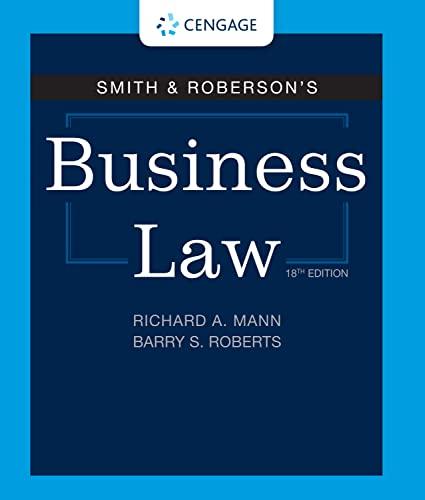Question
Chapter 17 Summary Conditions Definition of a Condition an event whose happening or nonhappening affects a duty of performance. Express Condition contingency explicitly set forth
Chapter 17 Summary
Conditions
Definition of a Conditionan event whose happening or nonhappening affects a duty of performance.
Express Conditioncontingency explicitly set forth in language.
- Satisfactionexpress condition making performance contingent upon one party's approval of the other's performance.
- Subjective Satisfactionapproval based upon a party's honestly held opinion.
- Objective Satisfactionapproval based upon whether a reasonable person would be satisfied.
- Satisfaction of a Third Partya contract may condition the duty of one contracting party to accept and pay for the performance of the other contracting party upon the approval of a third party who is not a party to the contract.
Implied-in-Fact Conditionscontingency understood by the parties to be part of the agreement, though not expressed.
Implied-in-Law Conditionscontingency not contained in the language of the contract but imposed by law; also called a constructive condition.
Concurrent Conditionsconditions that are to take place at the same time.
Conditions Precedentan event that must or must not occur before performance is due.
Conditions Subsequentan event that terminates a duty of performance
Discharge by Performance
Dischargetermination of a contractual duty
Performancefulfillment of a contractual obligation resulting in a discharge
Tendera party's offer to perform her obligation according to the terms of the contract.
Discharge by Breach
Definition of Breacha wrongful failure to perform the terms of a contract that gives rise to a right to damages by the injured party.
Material Breachnonperformance that significantly impairs the injured party's rights under the contract and discharges the injured party from any further duty under the contract.
- Prevention of Performanceone party's substantial interference with or prevention of performance by the other; constitutes a material breach and discharges the other party to the contract.
- Perfect Tender Rulestandard under the Uniform Commercial Code that a seller's performance under a sales contract must strictly comply with contractual duties and that any deviation discharges the injured party.
Substantial Performanceperformance that is incomplete but that does not defeat the purpose of the contract; does not discharge the injured party but entitles him to damages
Anticipatory Repudiationan inability or refusal to perform, before performance is due, that is treated as a breach, allowing the nonrepudiating party to bring suit immediately
Unauthorized Material Alteration of Written Contractan unauthorized and fraudulent alteration or change of a material term of a written contract by a party to the contract; discharges the entire contract
Discharge by Agreement of the Parties
Mutual Rescissionan agreement between the parties to terminate their respective duties under the contract.
Substituted Contracta new contract accepted by both parties in satisfaction of the parties' duties under the original contract.
Accord and Satisfactionsubstituted duty under a contract (accord) and the discharge of the prior contractual obligation by performance of the new duty (satisfaction)
Novationa substituted contract involving a new third-party promisor or promisee
Discharge by Operation of Law
Impossibilityperformance of contract cannot be done
- Objective Impossibilityno promisor is able to perform; generally discharges the promisor
- Subjective Impossibilitya particular promisorbut not all promisorsis unable to perform; does not discharge the promisor
- Destruction of Subject Matterwill discharge contract if it occurs without the promisor's fault
- Subsequent Illegalityif performance becomes illegal or impractical as a result of a change in the law, the duty of performance is discharged
- Frustration of Purposeprincipal purpose of a contract cannot be fulfilled because of a subsequent event
- Commercial Impracticabilitywhere performance can be accomplished only under unforeseen and unjust hardship, the contract is discharged under the Code and the Restatement
- Availability of Restitutiona person who renders more advanced performance under a contract that is discharged for impossibility, subsequent illegality, frustration, or impracticability is entitled to restitution to prevent unjust enrichment of the other party
Bankruptcydischarge available to a debtor who obtains an order of discharge by the bankruptcy court.
Statute of Limitationsafter the statute of limitations has run, the debt is not discharged, but the creditor cannot maintain an action against the debtor.
Questions:
Answer the following questions below by referring to chapter 17 law summary above and AI generated answers are not allowed.
1.
- Emily hired Amanda to paint her portrait for $200. Amanda painted the portrait. Everyone (except Emily) agreed that the portrait was excellent. Emily disagreed, and thought that Amanda did a poor job.
- Emily hired Amanda to paint her portrait, to her satisfaction, for $200. Amanda painted the portrait. Everyone (except Emily) agreed that the portrait was excellent. Emily disagreed, and thought that Amanda did a poor job
If Emily refused to pay, and Amanda sued her, who would win in each scenario? Explain your answers incorporating the relevant Chapter 17 law summary above.
2. Anne contracted to build a new home for Jen. As part of the contract, Anne agreed to build the house according to the specifications in the blueprints provided by Jen, and Jen agreed to pay Anne $200,000. The house specifications called for the use of DuraBrand shingles on the roof. The specifications also showed the length of the house to be 75 feet. When Anne built the house, she used Matco shingles. Matco shingles are known to be of the same quality as DuraBrand. When the house was completed, it was only 74 feet and 11 1/2 inches long.
Because the house was not built according to the specifications, Jen refused to pay Anne. Anne sued Jen for $200,000.
Who would win? Why?
Explain and discuss the relevant Chapter 17 contract law above.
Step by Step Solution
There are 3 Steps involved in it
Step: 1

Get Instant Access to Expert-Tailored Solutions
See step-by-step solutions with expert insights and AI powered tools for academic success
Step: 2

Step: 3

Ace Your Homework with AI
Get the answers you need in no time with our AI-driven, step-by-step assistance
Get Started


